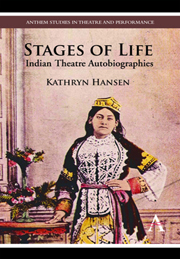Book contents
- Frontmatter
- Contents
- Illustrations
- Preface
- Acknowledgments
- PART 1
- PART 2
- 3 Narayan Prasad Betab, The Deeds of Betab
- 4 Radheshyam Kathavachak, My Theatre Days
- 5 Jayshankar Sundari, Some Blossoms, Some Tears
- 6 Fida Husain, Fifty Years in the Parsi Theatre
- PART 3
- Appendix 1 Historical Personages and Institutions
- Appendix 2 List of Plays and Films
- Glossary: Hindi and Urdu Terms
- Bibliography
- Index
4 - Radheshyam Kathavachak, My Theatre Days
from PART 2
Published online by Cambridge University Press: 05 March 2012
- Frontmatter
- Contents
- Illustrations
- Preface
- Acknowledgments
- PART 1
- PART 2
- 3 Narayan Prasad Betab, The Deeds of Betab
- 4 Radheshyam Kathavachak, My Theatre Days
- 5 Jayshankar Sundari, Some Blossoms, Some Tears
- 6 Fida Husain, Fifty Years in the Parsi Theatre
- PART 3
- Appendix 1 Historical Personages and Institutions
- Appendix 2 List of Plays and Films
- Glossary: Hindi and Urdu Terms
- Bibliography
- Index
Summary
Introduction
My Theatre Days is a classic autobiography from the Parsi theatre. Available since 2004 in a modern Hindi edition, it colorfully describes the life and times of Radheshyam Kathavachak, noted playwright and director. The book has enchanted readers with its portrait of commercial drama in North India in the days of Mahatma Gandhi and the Indian independence movement. Radheshyam straddled the great divide between older recitational practices that stressed personal devotion and more modern, public ways of marrying religious emotion and mythic stories to political agendas through theatre. He was by birth and training a reciter-singer in the Vaishnava sectarian tradition of the Hindi heartland. Bringing the poetic finesse and fervor of his background to the Parsi theatre, he created a series of powerful mythological plays. These dramas were performed by the New Alfred Theatrical Company at the very time that the nationalist movement was gaining momentum across North India. Radheshyam's use of Sanskritized Hindi and epic allegory were well matched to political and cultural trends of the 1920s, and he earned the respect of national leaders and literary giants like Premchand.
Radheshyam wore three or four hats, depending on how one counts. Firmly rooted in the world of oral performance, he gave devotional recitals all his life. He founded and operated a publishing house that printed devotional literature for the mass market. For several decades, he composed dramas while on contract with a large Parsi theatre company. And he worked in the film industry fitfully as well.
- Type
- Chapter
- Information
- Stages of LifeIndian Theatre Autobiographies, pp. 102 - 169Publisher: Anthem PressPrint publication year: 2011



